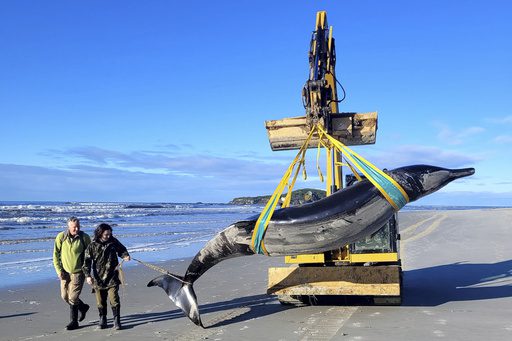A rare and intriguing discovery has unfolded on a beach near Taieri Mouth in New Zealand, where the unexpected appearance of a dead whale has sparked excitement among scientists. Believed to be a spade-toothed whale, described by the Department of Conservation (DOC) as the “world’s rarest whale,” this find offers a unique opportunity for researchers to delve into a species that has remained largely unknown since its initial identification in 1872. Named Mesoplodon traversii after naturalist Henry Travers, the spade-toothed whale was originally identified based on a few teeth and a jawbone.
View this post on Instagram
Measuring over 16 feet in length, the whale’s discovery has raised numerous questions due to the scarcity of information about its diet, habitat, and population size. Hannah Hendriks, a marine technical adviser for the DOC, highlighted the significant scientific potential of this discovery:
“We know very little, practically nothing. This is going to lead to some amazing science and world-first information. It’s very hard to do research on marine mammals if you don’t see them at sea. It’s a bit of a needle in a haystack. You don’t know where to look.”
The DOC shared the news on Instagram, acknowledging the rarity of the find and its implications for science and conservation:
“The world’s rarest whale has washed ashore in Otago. The spade-toothed whale is so rare only 6 specimens have ever been known to science. We are saddened to find this one has washed up deceased, but this will be a great opportunity to learn more on how we can help this cryptic species. From a scientific, cultural and conservation point of view, this is huge. We will work in partnership with Te Runanga o Otakou on next steps.”
Historically, sightings of the spade-toothed whale have been exceedingly rare, with only a few documented discoveries over the past century. These include findings in New Zealand during the 1950s and the discovery of bones in Chile in 1986, all confirmed to belong to the same unique species through DNA testing in 2002. Further discoveries in 2010 and 2017 in New Zealand have underscored the ongoing mystery surrounding these elusive mammals.
Kirsten Young, a senior lecturer at the University of Exeter specializing in spade-toothed whales, emphasized the challenges and intrigue surrounding the identification and study of these rare creatures:
“Identifying these mammals requires several years of hard work. It’s curious to think how many of these rare whales might be hiding in the deep ocean and how they live.”
Looking ahead, the DOC anticipates that it will take several months to complete genetic testing and definitively confirm the whale’s identity. This discovery represents a valuable opportunity to advance scientific knowledge and conservation efforts aimed at protecting one of the ocean’s least understood inhabitants.











